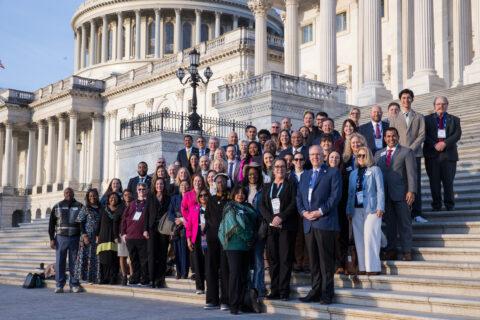On June 19th, the United States District Court for the District of Rhode Island issued a preliminary injunction in California v. U.S. Department of Transportation (USDOT) (PDF) preventing the USDOT from imposing immigration enforcement conditions on recipients to access or receive their grants. In its ruling, the Court “forbids and enjoins any attempt to implement the Immigration Enforcement Condition, and any actions by the Defendants to implement or enforce the Immigration Enforcement Condition.”
The judge found that the federal government failed to justify linking immigration enforcement cooperation to transportation funding, stating that “the Government does not cite to any plausible connection between cooperating with ICE enforcement and the congressionally approved purposes of the Department of Transportation.” In other words, the court determined that requiring local or state governments to assist with federal immigration enforcement as a condition of receiving USDOT grants lacked a policy basis rooted in the objectives of the transportation programs authorized by Congress.
This finding underscores a broader constitutional concern: Federal agencies cannot impose unrelated or unauthorized conditions on funding streams without clear legislative authority. The court emphasized that immigration enforcement falls under the jurisdiction of the U.S. Department of Homeland Security (DHS), not USDOT, and that leveraging transportation funds to compel such cooperation stretches beyond the scope of USDOT’s statutory mandate.
Case Background
On April 24th, USDOT issued a “Follow the Law” directive to all recipients of federal transportation funding. This letter put all grant and formula funding recipients on notice that they must comply with federal laws, specifically calling out cooperation with U.S. Immigration and Customs Enforcement (ICE) and other DHS enforcements regarding immigration. The directive also included conditions for those who implement “any policy, program, or activity that is premised on a prohibited classification, including discriminatory policies or practices designed to achieve so-called “diversity, equity, and inclusion” or “DEI,” goals.”
On May 13th, a coalition of 20 attorneys general filed suit against USDOT and Secretary Sean Duffy to challenge the immigration enforcement conditions contained in the USDOT letter. The plaintiff states are California, Connecticut, Colorado, Delaware, Hawaii, Illinois, Massachusetts, Maine, Maryland, Michigan, Minnesota, New Jersey, Nevada, New Mexico, New York, Oregon, Rhode Island, Vermont, Washington and Wisconsin. They argued that imposing these conditions on transportation funds, which Congress appropriated to support critical infrastructure projects, is beyond the agency’s legal authority.
Impact to Cities in 20 States
The preliminary injunction in this case means that for the 20 states included in the suit, and the local governments within these states, that USDOT is prohibited from:
- Implementing or enforcing the Immigration Enforcement Condition as set forth in the USDOT letter,
- Withholding or terminating federal funding based on the Immigration Enforcement Condition as set forth in the USDOT letter absent specific statutory authorization,
- Taking adverse action against any state entity or local jurisdiction, including barring it from receiving or making it ineligible for federal funding, based on the Immigration Enforcement Condition, absent specific statutory authorization
Cities in states not covered through this preliminary injunction should consult with their general counsel regarding appropriate steps to comply with grant requirements or take legal action of their own.
Get the Latest
Sign up for NLC’s Federal Advocacy Newsletter to get all the latest updates on what court rulings mean for local governments.










